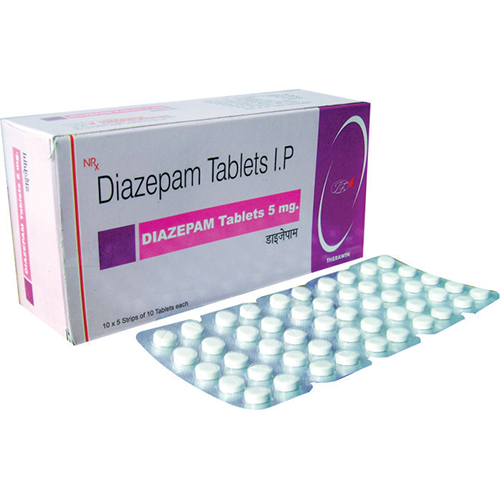Diazepam 5 mg Tablet
Description
Diazepam 5 mg is an oral medication containing the active ingredient Diazepam. It belongs to the class of drugs known as benzodiazepines. It acts as a central nervous system depressant, producing more pronounced calming, muscle-relaxing, anxiolytic (anti-anxiety), and anticonvulsant effects compared to the 2 mg strength. This dosage is commonly used for more moderate to severe anxiety, significant muscle spasms, or as part of acute withdrawal management.
Advantages
- Potent Anxiolytic: Highly effective in providing relief from moderate to severe anxiety and panic attacks.
- Strong Muscle Relaxant: Provides significant relief for severe muscle spasms and spasticity associated with various neurological conditions.
- Effective Sedative/Hypnotic: Can induce sleep and promote deep relaxation, useful for more pronounced insomnia or agitated states.
- Reliable Anticonvulsant: Important in the acute management of certain seizure disorders.
- Relatively Rapid Onset: Generally starts to exert its effects quickly after oral administration.
- Established Efficacy: A long-standing and well-understood medication with a broad range of applications.
Uses
Diazepam 5 mg is prescribed for a range of conditions where its pronounced central nervous system depressant effects are beneficial. Common uses include:
- Anxiety Disorders: Management of symptoms of moderate to severe anxiety, including generalized anxiety disorder, panic disorder, and anxiety associated with other medical or psychiatric conditions.
- Acute Alcohol Withdrawal: Treatment of acute alcohol withdrawal syndrome, helping to manage symptoms such as agitation, tremor, hallucinations, and delirium tremens, and preventing seizures.
- Muscle Spasms: Relief of severe skeletal muscle spasms due to trauma, inflammation, or chronic neurological disorders (e.g., cerebral palsy, multiple sclerosis, tetanus).
- Seizure Disorders: As an adjunctive treatment for certain convulsive disorders (e.g., status epilepticus, severe recurrent convulsive seizures), or for controlling acute seizure episodes.
- Pre-Operative/Procedural Sedation: To reduce anxiety and provide light sedation before surgical or diagnostic procedures.
- Insomnia: Short-term management of severe insomnia, especially when associated with significant anxiety or muscle tension.
Nature
Diazepam is a benzodiazepine. Its primary mechanism of action involves binding to specific sites on the gamma-aminobutyric acid (GABA) type A (GABA-A) receptors in the central nervous system. By doing so, it enhances the effects of GABA, which is the brain’s main inhibitory neurotransmitter. This enhancement leads to increased chloride ion influx into neurons, hyperpolarizing them and making them less excitable. This results in the characteristic pharmacological actions:
- Anxiolytic: By dampening excessive neural activity.
- Sedative/Hypnotic: By promoting CNS depression.
- Muscle Relaxant: By acting on polysynaptic reflexes in the spinal cord and supraspinal sites.
- Anticonvulsant: By stabilizing neuronal membranes and inhibiting the propagation of seizure activity.
Due to its potential for tolerance, physical dependence, and withdrawal symptoms, Diazepam is typically recommended for short-term use or for specific, acute indications under strict medical supervision. Gradual tapering is often necessary when discontinuing treatment.
Storage
- Room Temperature: Store Diazepam 5 mg tablets at controlled room temperature, typically between 20°C to 25°C (68°F to 77°F). Brief excursions between 15°C and 30°C (59°F and 86°F) are generally permitted.
- Protect from Light and Moisture: Keep the tablets in their original, tightly closed container, protected from direct light, heat, and excessive humidity. Avoid storing in areas like bathrooms or near a sink.
- Keep Out of Reach of Children: Store the medication in a secure place, well out of the sight and reach of children and pets, to prevent accidental ingestion or misuse, which can be particularly dangerous.
- Do Not Freeze: Do not freeze the tablets, as this can affect their stability and effectiveness.
- Check Expiry Date: Always check the expiry date on the packaging. Do not use the medication after this date. Properly dispose of any expired or unused medication according to local pharmacy or waste disposal guidelines for controlled substances.
- Controlled Substance: As a controlled substance in many regions (including India), ensure it is stored securely to prevent theft or diversion.

